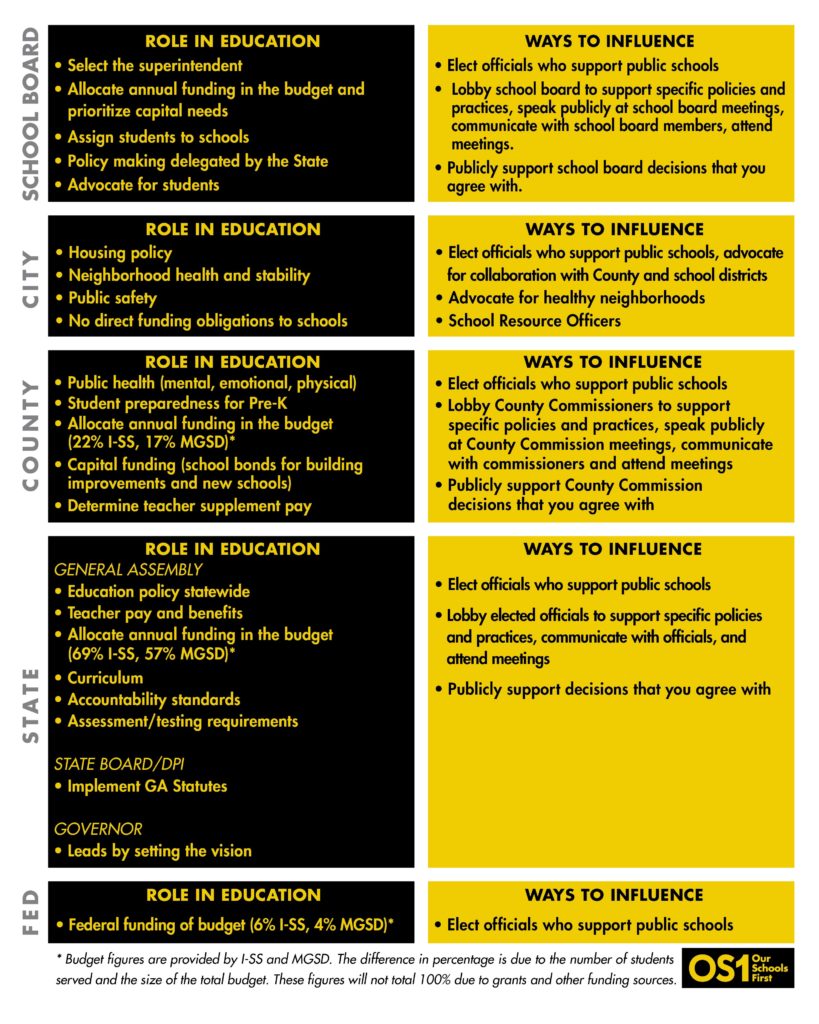
Download the file above in .pdf format here.
Making better public schools starts when we elect pro-ed candidates at the local level–Boards of Education, county commissioners, and state representatives.
Local officials are charged with some of the most important decisions directing our local public schools. They’re the ones who help create vision, fund programs and buildings, and establish day-to-day policies that impact students and teachers every day–for better or for worse.
Candidates for local office have a lot more power and influence than you might think over public education. And as you can see, the best way to create better schools is by electing officials who support public education.
READ OS1’s CANDIDATE ENDORSEMENTS HERE
With a hat tip to OneMeck.org, who inspired the chart we designed above, we wanted to share how different offices have the opportunity to affect change in public schools.
School Board
ROLE IN EDUCATION
• Select the superintendent
• Allocate annual funding in the budget and prioritize capital needs
• Assign students to schools
• Policy making delegated by the State
• Advocate for students
WAYS TO INFLUENCE
• Elect officials who support public schools
• Lobby school board to support specific policies and practices, speak publicly at school board meetings, communicate with school board members, attend meetings.
• Publicly support school board decisions that you agree with.
City Council
ROLE IN EDUCATION
• Housing policy
• Neighborhood health and stability
• Public safety
• No direct funding obligations to schools
WAYS TO INFLUENCE
• Elect officials who support public schools, advocate for collaboration with County and school districts
• Advocate for healthy neighborhoods
• School Resource Officers
County Commissioners
ROLE IN EDUCATION
• Public health (mental, emotional, physical)
• Student preparedness for Pre-K
• Allocate annual funding in the budget (22% I-SS, 17% MGSD)*
• Capital funding (school bonds for building improvements and new schools)
• Determine teacher supplement pay
WAYS TO INFLUENCE
• Elect officials who support public schools
• Lobby County Commissioners to support specific policies and practices, speak publicly
at County Commission meetings, communicate with commissioners and attend meetings
• Publicly support County Commission decisions that you agree with
State Officials
ROLE IN EDUCATION
GENERAL ASSEMBLY
• Education policy statewide
• Teacher pay and benefits
• Allocate annual funding in the budget (69% I-SS, 57% MGSD)*
• Curriculum
• Accountability standards
• Assessment/testing requirements
STATE BOARD/DPI
• Implement GA Statutes
GOVERNOR
• Leads by setting the vision
WAYS TO INFLUENCE
• Elect officials who support public schools
• Lobby elected officials to support specific policies and practices, communicate with officials, and attend meetings
• Publicly support decisions that you agree with
Federal Government
ROLE IN EDUCATION
• Federal funding of budget (6% I-SS, 4% MGSD)*
WAYS TO INFLUENCE
• Elect officials who support public schools
* Budget figures are provided by I-SS and MGSD. The difference in percentage is due to the number of students served and the size of the total budget. These figures will not total 100% due to grants and other funding sources.
